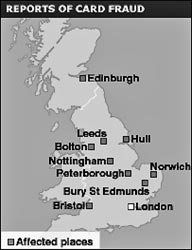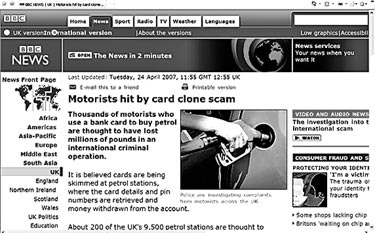
British broadcaster wakes up from its slumberWhile illegal fund raising, credit card scams and intimidation of the Tamil community by those who demand money, sometimes in the name of the LTTE, have gone on for years in the Sri Lankan community in Britain, the BBC behaved like the three proverbial monkeys rolled into one. The British broadcaster, which likes to present itself to the world as an impeccable news source and an impartial purveyor of news, has ignored what was going on literally in its own backyard. It saw no evil, heard no evil and spoke no evil despite the fact that fund raising by banned organisations was in violation of Britain's own terrorism laws.
If the BBC continued to ignore what was surely news, its Sinhala service "Sandesaya" was blind and dumb. If it claims to be a news service that caters to Sri Lanka and Sri Lankans worldwide irrespective of their ethnicity, what happens in the Sri Lankan community here should surely be of some interest, unless, of course, those who inhabit the Sinhala service lack a basic understand of journalism and a nose for news. Whereas the BBC domestic and world services seemed uninterested in these happenings, the Sinhala service has been taken to task by Sri Lankans here and elsewhere for what they see as selective reportage that gives weightage to LTTE and generally anti- Sri Lanka government points of view. This perception of the Sandesaya service has led to written protests to the BBC and the service itself and to demonstrations opposite BBC studios by those who have felt offended by the reports the service has broadcast or included in its website. Then suddenly this month, the BBC got activated. A little over a week ago the BBC which had earlier turned a Nelsonian eye to news that seemed obvious to others, broadcast a story about credit card frauds and cloning of credit cards in which huge sums of money have been stolen. The report said that those patronising some 200 filling stations in different parts of the country were fleeced of thousands of pounds from their accounts. Those who filled up at petrol stations and used their credit cards to pay, had details of their cards, including pin numbers, 'skimmed' and details transferred to cloned cards.
The news story was broadcast every hour on the hour for at least half the day and it also went on BBC World and News 24. Why this sudden burst of activity by the BBC? To any observer who was also aware of the background to this story and how the BBC had ignored this even though there had been several previous convictions of persons of Sri Lankan origin for such offences and complaints had been made to the Metropolitan Police, to the Foreign Office and the Home Office. Some these complaints apparently related to money laundering and fund raising at LTTE- sponsored events such as "Heroes Day". But BBC including the Sandesaya service took no professional interest in them. During the arrests in Thailand the police found 5000 credit cards, all of them probably cloned or stolen, in the possession of one person. These stories were freely available on international agency websites or those of the newspapers in the southeast countries concerned. Despite the fact all the arrested persons were from Britain and were arrested in three different countries for the same or similar offences, this did not seem to make any impression on the worthies in the BBC news and current affairs divisions. The Sinhala service probably saw them and ignored what should have been an obvious follow up. Apparently it did not suit whatever policy they have adopted. Why then did the BBC suddenly awaken now? Because those who were fleeced and had money stolen from their accounts were white people living in Britain, or most of them were, to judge by those who were interviewed and spoke to BBC. Otherwise it is difficult to understand the BBC's sudden interest.Had the frauds, the fund-raising and money laundering been confined to the Sri Lankan or other Asian community, the BBC would probably be still unaware or unconcerned. But when ethnically 'white' people are the victims, the BBC rushes to their aid repeating the story often enough so the public at large are sufficiently warned. A couple of months back "The Times" of London carried a well displayed story by Tom Whipple on extortion, coercion and intimidation of Tamils by other Tamils who were demanding donations supposedly on behalf of the LTTE. Whether the LTTE had approved such fund raising I personally do not know though some Tamils say so. A month or so ago the Qatar-based Al Jazeera television carried a long piece titled "Tiger Taxes" by reporter Juliana Ruhfus which highlighted the pressures the generally non-political or non-LTTE Tamils are subjected to allegedly by LTTE money raisers. For some time now the Humberside police had been investigating the credit card racket and had mentioned the possible involvement of Tamil gangs in the petrol filling station scam in Hull. Detective Inspector Paul Welton of Humberside police was quoted in The Sunday Times this month as saying "We are aware of this type of crime being one of the main ways of funding the Tamil Tigers. It is quite clear from the number of cards cloned that this is an intelligent, well organised group of criminals." All the previous reportage and police investigations went by without even a glance by the BBC or its Sinhala service until the other day. The extended publicity on both domestic and world services have unfortunately tainted the entire Sri Lankan community, especially the Tamils, the vast majority of whom are law abiding citizens trying to make a life in this country. What is of interest to media watchers and the public is how the Sinhala service seems to have done a hatchet job for the Tigers. The Sinhala service which could not have been ignorant of what has been going on for years in the Sri Lankan community but ignored it all, came virtually to the defence of the LTTE, undermining the parent broadcaster itself. On April 22, the Sinhala service carried a report on its website headlined "BBC report 'one sided'-LTTE". The report began thus: "Tamil Tigers of Sri Lanka has (sic!) criticised the BBC for publishing a 'one sided' report on credit card scam in UK. "Accusing Sri Lanka government of trying to "divert attention" on international focus over human rights violations, the LTTE rejects accusations that their members involved in the scam…. The Sri Lanka government claims the rebel Tamil Tigers are to blame but police say there is no definite link. But the LTTE rejects the accusation." "Neither the majority of the Tamil Diaspora nor the LTTE involve itself in activities in other countries that are against laws of that country," a LTTE statement issued on Sunday stated. Well we all know about its respect for the law. If the BBC cannot teach the Sinhala service good journalism at least it could do something about its English and correct it before the reports get on the website. Now the Tigers have launched a campaign against the BBC, news reports said. Well, talk of biting the hand that feeds you. |
| || Front
Page | News
| Editorial
| Columns
| Sports
| Plus
| Financial
Times | International
| Mirror
| TV
Times | Funday
Times || |
| |
Copyright
2007 Wijeya
Newspapers Ltd.Colombo. Sri Lanka. |

